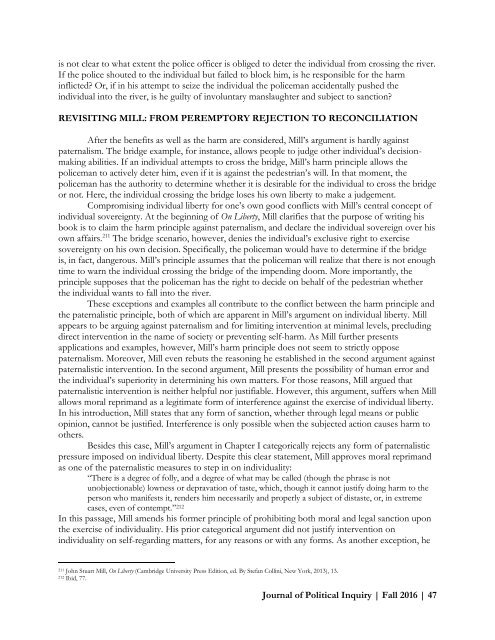Fall2016_Final
You also want an ePaper? Increase the reach of your titles
YUMPU automatically turns print PDFs into web optimized ePapers that Google loves.
is not clear to what extent the police officer is obliged to deter the individual from crossing the river.<br />
If the police shouted to the individual but failed to block him, is he responsible for the harm<br />
inflicted? Or, if in his attempt to seize the individual the policeman accidentally pushed the<br />
individual into the river, is he guilty of involuntary manslaughter and subject to sanction?<br />
REVISITING MILL: FROM PEREMPTORY REJECTION TO RECONCILIATION<br />
After the benefits as well as the harm are considered, Mill’s argument is hardly against<br />
paternalism. The bridge example, for instance, allows people to judge other individual’s decisionmaking<br />
abilities. If an individual attempts to cross the bridge, Mill’s harm principle allows the<br />
policeman to actively deter him, even if it is against the pedestrian’s will. In that moment, the<br />
policeman has the authority to determine whether it is desirable for the individual to cross the bridge<br />
or not. Here, the individual crossing the bridge loses his own liberty to make a judgement.<br />
Compromising individual liberty for one’s own good conflicts with Mill’s central concept of<br />
individual sovereignty. At the beginning of On Liberty, Mill clarifies that the purpose of writing his<br />
book is to claim the harm principle against paternalism, and declare the individual sovereign over his<br />
own affairs. 211 The bridge scenario, however, denies the individual’s exclusive right to exercise<br />
sovereignty on his own decision. Specifically, the policeman would have to determine if the bridge<br />
is, in fact, dangerous. Mill’s principle assumes that the policeman will realize that there is not enough<br />
time to warn the individual crossing the bridge of the impending doom. More importantly, the<br />
principle supposes that the policeman has the right to decide on behalf of the pedestrian whether<br />
the individual wants to fall into the river.<br />
These exceptions and examples all contribute to the conflict between the harm principle and<br />
the paternalistic principle, both of which are apparent in Mill’s argument on individual liberty. Mill<br />
appears to be arguing against paternalism and for limiting intervention at minimal levels, precluding<br />
direct intervention in the name of society or preventing self-harm. As Mill further presents<br />
applications and examples, however, Mill’s harm principle does not seem to strictly oppose<br />
paternalism. Moreover, Mill even rebuts the reasoning he established in the second argument against<br />
paternalistic intervention. In the second argument, Mill presents the possibility of human error and<br />
the individual’s superiority in determining his own matters. For those reasons, Mill argued that<br />
paternalistic intervention is neither helpful nor justifiable. However, this argument, suffers when Mill<br />
allows moral reprimand as a legitimate form of interference against the exercise of individual liberty.<br />
In his introduction, Mill states that any form of sanction, whether through legal means or public<br />
opinion, cannot be justified. Interference is only possible when the subjected action causes harm to<br />
others.<br />
Besides this case, Mill’s argument in Chapter I categorically rejects any form of paternalistic<br />
pressure imposed on individual liberty. Despite this clear statement, Mill approves moral reprimand<br />
as one of the paternalistic measures to step in on individuality:<br />
“There is a degree of folly, and a degree of what may be called (though the phrase is not<br />
unobjectionable) lowness or depravation of taste, which, though it cannot justify doing harm to the<br />
person who manifests it, renders him necessarily and properly a subject of distaste, or, in extreme<br />
cases, even of contempt.” 212<br />
In this passage, Mill amends his former principle of prohibiting both moral and legal sanction upon<br />
the exercise of individuality. His prior categorical argument did not justify intervention on<br />
individuality on self-regarding matters, for any reasons or with any forms. As another exception, he<br />
211<br />
John Stuart Mill, On Liberty (Cambridge University Press Edition, ed. By Stefan Collini, New York, 2013), 13.<br />
212<br />
Ibid, 77.<br />
Journal of Political Inquiry | Fall 2016 | 47
















